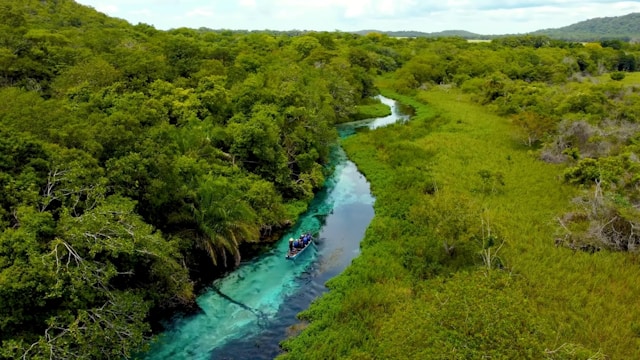
Ecotourism is a form of responsible travel that focuses on visiting natural areas while minimizing environmental impact and supporting conservation efforts. This approach to tourism basically combines adventure, education, and sustainability, allowing travelers to experience pristine environments while actively contributing to their preservation.
The International Ecotourism Society defines it as “responsible travel to natural areas that conserves the environment, sustains the well-being of local people, and involves interpretation and education.”
This definition encompasses the core principles that set it apart from conventional tourism.
Why is ecotourism important?
Ecotourism plays a crucial role in promoting sustainable development and conservation around the world. As global tourism continues to grow, its impact on fragile ecosystems and local communities becomes increasingly significant. It offers a solution to mitigate these negative effects while still allowing people to explore and appreciate the world’s natural wonders.
The importance of ecotourism lies in its ability to:
- Promote conservation: By creating economic incentives for preserving natural areas, ecotourism encourages governments and local communities to protect biodiversity and ecosystems.
- Raise awareness: Travelers gain firsthand experience of environmental issues and cultural heritage, fostering a deeper understanding and appreciation of the natural world.
- Support local economies: Ecotourism provides alternative livelihoods for communities that might otherwise rely on unsustainable practices like logging or poaching.
- Encourage sustainable practices: Its principles can influence broader tourism trends, pushing the industry towards more environmentally friendly operations.
- Preserve cultural heritage: By promoting respect for local cultures and traditions, ecotourism helps maintain the unique identities of communities around the world.
How does ecotourism help the environment?
Ecotourism contributes to environmental protection through various mechanisms:
- Direct conservation funding: Many operations allocate a portion of their profits to local conservation projects, providing much-needed resources for habitat restoration, species protection, and research.
- Habitat preservation: The economic value of intact ecosystems creates a strong incentive to preserve natural areas rather than exploit them for short-term gain.
- Reduced environmental impact: Specific facilities often implement sustainable practices such as renewable energy use, waste reduction, and water conservation, minimizing their ecological footprint.
- Education and awareness: By exposing visitors to environmental issues and conservation efforts, ecotourism fosters a sense of stewardship that can lead to more sustainable behaviors long after the trip ends.
- Monitoring and research: It can facilitate scientific research by providing access to remote areas and funding for long-term ecological studies.
- Invasive species control: Some projects actively involve visitors in efforts to remove invasive species, directly contributing to ecosystem health.
Is ecotourism sustainable?
When properly implemented, ecotourism can be a highly sustainable form of travel. However, its sustainability depends on careful planning, management, and continuous evaluation.
Factors contributing to sustainability include:
- Carrying capacity management: Limiting the number of visitors to prevent overuse of natural resources and ecosystem degradation.
- Long-term planning: Developing ecotourism projects with a focus on long-term environmental and community benefits rather than short-term profits.
- Local involvement: Ensuring that local communities are active participants in ecotourism development and management.
- Continuous monitoring: Regularly assessing the environmental and social impacts of ecotourism activities and adjusting practices as needed.
- Certification programs: Adhering to recognized standards and certifications to maintain high levels of sustainability.
However, challenges to sustainability exist:
- Greenwashing: Some operators may market themselves as “eco-friendly” without actually following sustainable practices.
- Overexploitation: Popular destinations can become victims of their own success if visitor numbers are not properly managed.
- Cultural impacts: Increased tourism can sometimes lead to the commercialization of local cultures.
To ensure the sustainability of ecotourism, ongoing efforts are needed to address these challenges and maintain a balance between conservation, community benefits, and visitor experiences.
How does it help local communities?
Ecotourism can significantly benefit local communities in various ways:
- Economic opportunities: It creates jobs in guiding, hospitality, transportation, and other related sectors, providing alternative livelihoods for local residents.
- Income diversification: Communities that previously relied on unsustainable practices like logging or fishing can supplement their income through ecotourism.
- Skill development: Training programs associated with projects can enhance local skills in areas such as language, business management, and conservation.
- Infrastructure improvements: Ecotourism development often leads to improvements in local infrastructure, including roads, healthcare facilities, and schools.
- Cultural preservation: By valuing local traditions and customs, ecotourism can help reinforce cultural identity and pride.
- Environmental education: Local communities gain increased awareness of environmental issues and conservation techniques through their involvement in ecotourism.
- Empowerment: Community-based ecotourism initiatives give local residents more control over their resources and development priorities.
How can individual tourists contribute?
Individual travelers play a crucial role in the success of ecotourism. Here are ways tourists can contribute:
- Choose certified eco-lodges: Stay at accommodations that have been vetted for their environmental and social practices.
- Respect local customs: Learn about and adhere to local cultural norms and traditions.
- Minimize waste: Carry reusable water bottles, avoid single-use plastics, and properly dispose of waste.
- Support local businesses: Purchase locally made products and use local guides to ensure economic benefits stay in the community.
- Conserve resources: Be mindful of water and energy use, especially in areas where these resources are scarce.
- Follow guidelines: Adhere to park rules, stay on designated trails, and maintain appropriate distances from wildlife.
- Volunteer: Participate in conservation activities or community projects offered by eco-lodges or local organizations.
- Spread awareness: Share experiences and knowledge gained during ecotourism trips to inspire others to travel responsibly.
- Choose low-impact transportation: Opt for public transport or human-powered options like hiking or cycling when possible.
- Be a responsible wildlife viewer: Never feed or touch wild animals, and pick ethical wildlife viewing experiences.
By making conscious choices and actively participating in conservation efforts, individual tourists can significantly contribute to the positive impact of ecotourism on both the environment and local communities.